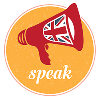- Practice makes perfect
- Don't freak out
- Immerse yourself in English
- Have an "English" mind
- Focus on the big picture
- Learn and remember phrases
- try to do more in English
So you want to speak like a native? You have a lot of vocabulary and your grammar is going well, but you just can’t seem to sound better – you might be lacking fluency!Being ‘Fluent’ is essential to communicate in any language – but what exactly does it mean? Fluency is the FLOW of a language – how quickly and easily you can produce words and sentences while still sounding natural.
Now, you might be asking yourself, “Why is fluency important?” Especially if you have been studying for a while and can understand most things you read and hear. Well speaking English fluently is essential if you want native speakers to understand you. Additionally, our language ability is one of our most visible skills! If you are at work and your fluency level is not very high, your boss or colleagues may unfairly judge the quality of your work.
Here are seven easy ways that you can work on your fluency
1. Practice makes perfect!
The first time you hear a new word or phrase, it may be hard to remember and pronounce it, but the hundredth time you hear it, it will be effortless. All of English is like this – remember, even native speakers spend many years in school learning spelling and pronunciation. There’s a phrase in English that goes ‘use it or lose it!’ which means that if you don’t use something, it will become useless. English is the same — the more you use English, the better you become, and the less you use it, the less fluent you will be.
2. Don’t freak out!
The number one tip in sounding more fluent is to relax! Learning English can be very stressful. When you’re tense, you’re more likely to make mistakes, such as using the wrong word or mispronouncing something. Remember that most native speakers are happy to help you if you’re struggling. Next time you feel stressed out about your English, take a deep breath and focus on what you are trying to communicate!
3. Immerse yourself in English
The best way to learn a language quickly is to surround yourself with it! Try out an intensive English course where you’re exposed to the language every day, watch movies and TV shows in English (no subtitles!), try online karaoke with English songs, and make English friends! The more exposure you have to a language, the quicker you’ll be able to pick it up! You can start small – change the default language on your phone to English!
4. Have an ‘English Mind’
If you want to be fluent, you have to start thinking in English. It’s tricky to translate words and phrases into your mother tongue constantly. Instead, try thinking of images instead of words. For example, use the word ‘cat’ – instead of thinking of the word for ‘cat’ in your language, imagine an image of a cat and say the word ‘CAT’ in English. You can also make flashcards with pictures or put up post-its on all the objects in your home with English words on them.
5. Focus on the ‘big picture.’
Many students focus on hearing individual words when listening to a native speaker, but that’s not all there is to it. Sounding good in English means using the correct words, as well as proper pronunciation and intonation. Also, most native speakers don’t speak perfect English one hundred percent of the time – we use slang, different dialects and a lot of contractions and connected speech. When having a conversation with a native speaker, make a mental note of their intonation and pronunciation. Listen to where English speakers connect words, for example, saying ‘ya’ instead of ‘you’ or ‘where’d you go’ instead of ‘ where did you go’ and try to imitate them as much as possible.
6. Learn and remember phrases
In English, there are a wide variety of set phrases that we always use. It’s also much easier to learn whole phrases than to learn individual words. Think about the sentences you use a lot in your native language and try to translate them into English (ask a native speaker to check!). You can think about the situations you are in often and what you need to communicate, then learn sentences related to that. Keep using these phrases, and you will be surprised how much you will be able to communicate!
7. Try to do more in English.
Stop telling yourself that you are an English learner, but rather, look at yourself as an English speaker. This small psychological change will help give you a lot more confidence. When you look at yourself as an English speaker, you will be able to do a lot more in English. Try challenging yourself as much as possible by doing things that you usually do in your mother tongue, in English such as: making appointments, asking for help, joining sports teams, or even just starting a conversation with a stranger in a coffee shop. Fake it til you make it!

